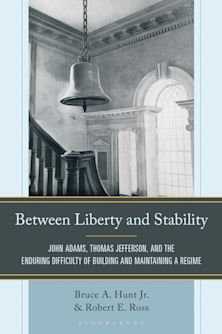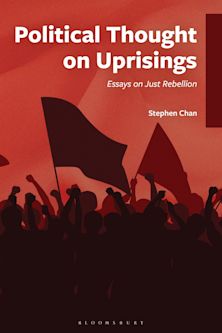- Home
- ACADEMIC
- Politics & International Relations
- Political Theory and Philosophy
- Property and the Pursuit of Happiness
Property and the Pursuit of Happiness
Locke, the Declaration of Independence, Madison, and the Challenge of the Administrative State
Property and the Pursuit of Happiness
Locke, the Declaration of Independence, Madison, and the Challenge of the Administrative State
- Delivery and returns info
-
Free CA delivery on orders $40 or over
You must sign in to add this item to your wishlist. Please sign in or create an account
Description
In this book, Edward Erler brings a lifetime of study of political philosophy, the American founding, and the US constitution to the central role of property in American constitutional thought. Erler argues that the Founders considered the natural right to property as the comprehensive right that included every other right. In this sense they followed political philosopher John Locke, but at the same time made significant improvements on Locke, making it moral and political, something they called the “pursuit of happiness.”
In the past century, this understanding of the right to property—derived from the principles of the Declaration of Independence—has been challenged by the rise of progressivism, which places promoting community welfare above the protection of individual rights as the central role of government. This has led to the administrative state’s unrelenting attacks on the right to private property, which have effectively ended the right to property as it was understood by the founders. Property and the Pursuit of Happiness offers a learned and wide-ranging discussion of the values at the core of America’s founding that will be of interest to all readers seeking to understand the founders’ vision and the profound challenges to it today.
Product details
| Published | Jul 26 2019 |
|---|---|
| Format | Hardback |
| Edition | 1st |
| Extent | 248 |
| ISBN | 9781538130865 |
| Imprint | Rowman & Littlefield |
| Dimensions | 235 x 161 mm |
| Publisher | Bloomsbury Publishing |
About the contributors
Reviews
-
For the past forty years, Professor Edward Erler, has produced some of the finest legal commentary on constitutional law. He remains, perhaps, the most original, insightful, and provocative scholar of the American Constitution. His new book, Property and the Pursuit of Happiness; Locke, The Declaration of Independence, Madison and the Challenge of the Administrative State, shows why this is so. His insight into the Constitution is informed not merely by an understanding of the law, the judiciary, or the Constitution, but by an understanding of the theoretical and political conditions required in the defense of freedom and self-government. In elaborating the importance of property, as essential to the protection of rights, he reveals the absolute necessity of limited government constitutionalism as indispensable for the preservation of both.
John Marini, University of Nevada, Reno
-
Edward Erler has written the most remarkable book by any student of Harry Jaffa, which also means most likely by any student of Leo Strauss. Property and the Pursuit of Happiness explores the political and the philosophic meaning of both its key terms in America. He transcends dichotomies such as “ancients and moderns” to present the abiding heart of America’s logos in its ousia. Erler’s treatise smashes lame scholarship and noxious doctrines about Aristotle, Locke, Madison, Jefferson, Lincoln, the Supreme Court, Reconstruction, and the administrative state, and against them restores the principles of the West in the theological-political problem. Every serious citizen and scholar must come to terms with this profound and spirited examination of American politics.
Ken Masugi, Center for Advanced Governmental Studies, Johns Hopkins University
-
“What was unique about the American Revolution,” Ed Erler contends, “was that for the first time in history, a nation was founded dedicated to a universal principle—the principle that ‘all men are created equal.’” What is unique about Ed Erlers’s penetrating book is that it takes the Declaration’s truths seriously and elucidates how they provide the grounds for the Founders’ constitutionalism. Exploring some of political philosophy’s deepest themes—including natural rights, natural law, and the relationship between reason and revelation—Erler explains how the Founders held the protection of property rights to be the central idea animating their design for limited government and why its abandonment by influential 20th century progressives poses an existential threat to liberty and the pursuit of happiness for all Americans today.
Vincent Munoz, Associate Professor of Political Science at University of Notre Dame



































